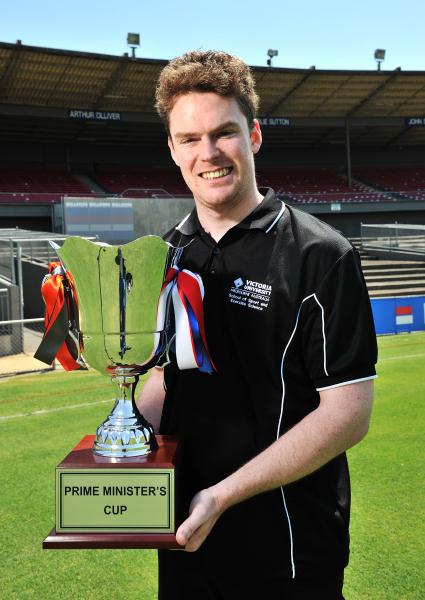By XAVIER SMERDON
WHILE she was in office almost every aspect of former Prime Minister Julia Gillard’s life and work was analysed on an almost daily basis.
But a Tarneit student has used his summer holidays to research a different side of Australia’s first female Prime Minister, her identity as a western suburbs Australian Rules Football fan.
Sport and Recreation Management student Sam Wharton has spent time researching the Prime Minister’s Cup – created under Julia Gillard for the winner between the Western Bulldogs and Greater Western Sydney football matches – as part of a Victoria University Summer School.
The select group of students in the program each researched an aspect of history in elite sporting organisations including the Western Bulldogs and the Sport Australia Hall of Fame.
“I chose to research the Prime Minister’s Cup because I thought there was an interesting story there about what the two clubs have in common and about how Julia Gillard sees herself as a Bulldogs supporter who grew up in the western suburbs to become the first female PM,” Sam said.
“As part of the project I’m asking questions about her ideas behind implementing the cup, how she identifies with the western suburbs and how she got into football, which is all pretty exciting.”
Sam said the opportunity to go behind the scenes of a professional sporting organisation and contribute to their legacy had been satisfying.
“You leave a day at the Bulldogs Museum feeling like you’ve contributed something to the club and along the way experienced another pathway you might want to follow once you graduate,” he said.
Victoria University sport historian and program manager Dr Rob Hess said students, who present their findings to academic staff and club personnel in the Victoria University Whitten Oval boardroom at the end of summer school, produced some fascinating findings.
“There are always interesting snippets of history about the memorabilia associated with the club, the scandals or controversies that often erupted, and the amazing rivalries that particular players or teams had with other clubs,” Dr Hess said.
“We collect all this miscellaneous research and add it to the club’s database: the club appreciates the knowledge transfer because it helps them build their history and the students love it because it’s such a real-life learning experience for them.”


